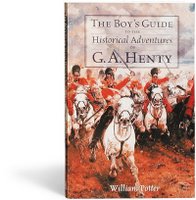The Boy’s Guide to the Historical Adventures of G. A. Henty

The Boy’s Guide to the Historical Adventures of G. A. Henty
By William Porter (Vision Forum, 2000), pb., 122 pp.
Since I just commented on one of Mr. Henty’s famous novels I thought it might be useful to mention this volume. The book is divided into two parts. The first part is entitled, “Why Boys Should Read the Magnificent Adventures of G. A. Henty,” and contains and introduction to the man and his work. Some might object to the exclusive focus on boys here, but there is no reason to do so. It is valuable to have books that address each gender specifically. Henty’s primary audience was boys as he sought to encourage and teach the values of courage, nobility and heroism- ideas which are not so highly prized to day but are all the more sorely missed. Furthermore, Henty pursues this task from a Christian worldview which is readily apparent in his books. The book contains this excerpt from an interview with Mr. Henty:
To be a true hero you must be a true Christian. To sum up, then, heroism is largely based upon two qualities- truthfulness and unselfishness, a readiness to put one’s own pleasure aside for that of others, to be courteous to all, kind to those younger than yourself, helpful to your parents, even if that helpfulness demands some slight sacrifice of your own pleasure. You must remember that these two qualities are true signs of Christian heroism. If one is to be a true Christian, one must be a Christian hero. True heroism is inseparable from true Christianity, and as a step towards the former I would urge most strongly and urgently the practice of the latter.It is because this vision so much mirrors my own that I have collected Henty books for my boys. One other quote from the book (this time from Porter) will also help to make the point:
Perhaps the best reason boys should read G. A. Henty has already been alluded to: the Christian character of Henty’s boy-heroes made them men of Honor, fortitude, and perseverance. They took their place as leaders in the army, in civil government, in their professions, in trade, and in their families. They became manly men, unwavering in principle, eager to defend their families and prepared to die for family, nation, comrades, or in a just cause. Many of the real historical characters that anchor the stories, though flawed as all men are, still set examples that did not disappoint the boys of the story. From Richard the Lionhearted to William Wallace, from King Alfred to Gustavus Adolphus, from ‘Chinese’ Gordon to the Duke of Wellington, we see examples of men devoted to duty, unafraid of death, makers of history. Are these not traits we want our boys to admire and embrace?The second, and longer, part lists 72 of Henty’s historical adventures chronologically and grouped according to historical eras. They span from 1250 B.C. to 1900 A.D. A page is given to each story describing the basic gist of the story. This provides a great tool for using these books in teaching your own children history. Whatever period you are studying, this volume can show you which Henty books are set in that period. Porter claims to have listed all of Henty’s historical novels written specifically for boys. I think I have found some not listed here, but I may be mistaken. At any rate, this book is a very useful tool both for arranging these novels historically and for providing an introduction to this man’s life.
Labels: G A Henty


0 Comments:
Post a Comment
<< Home